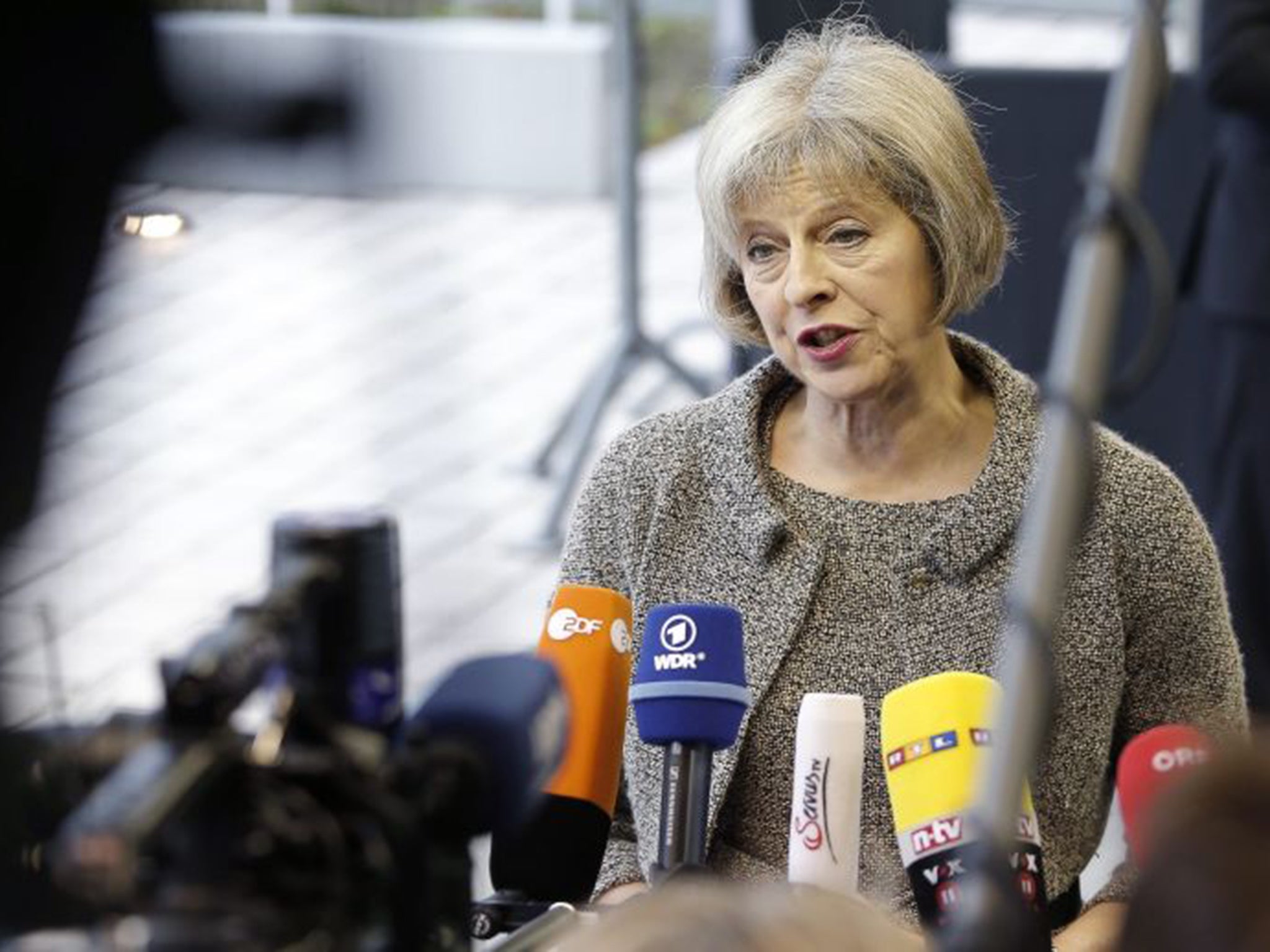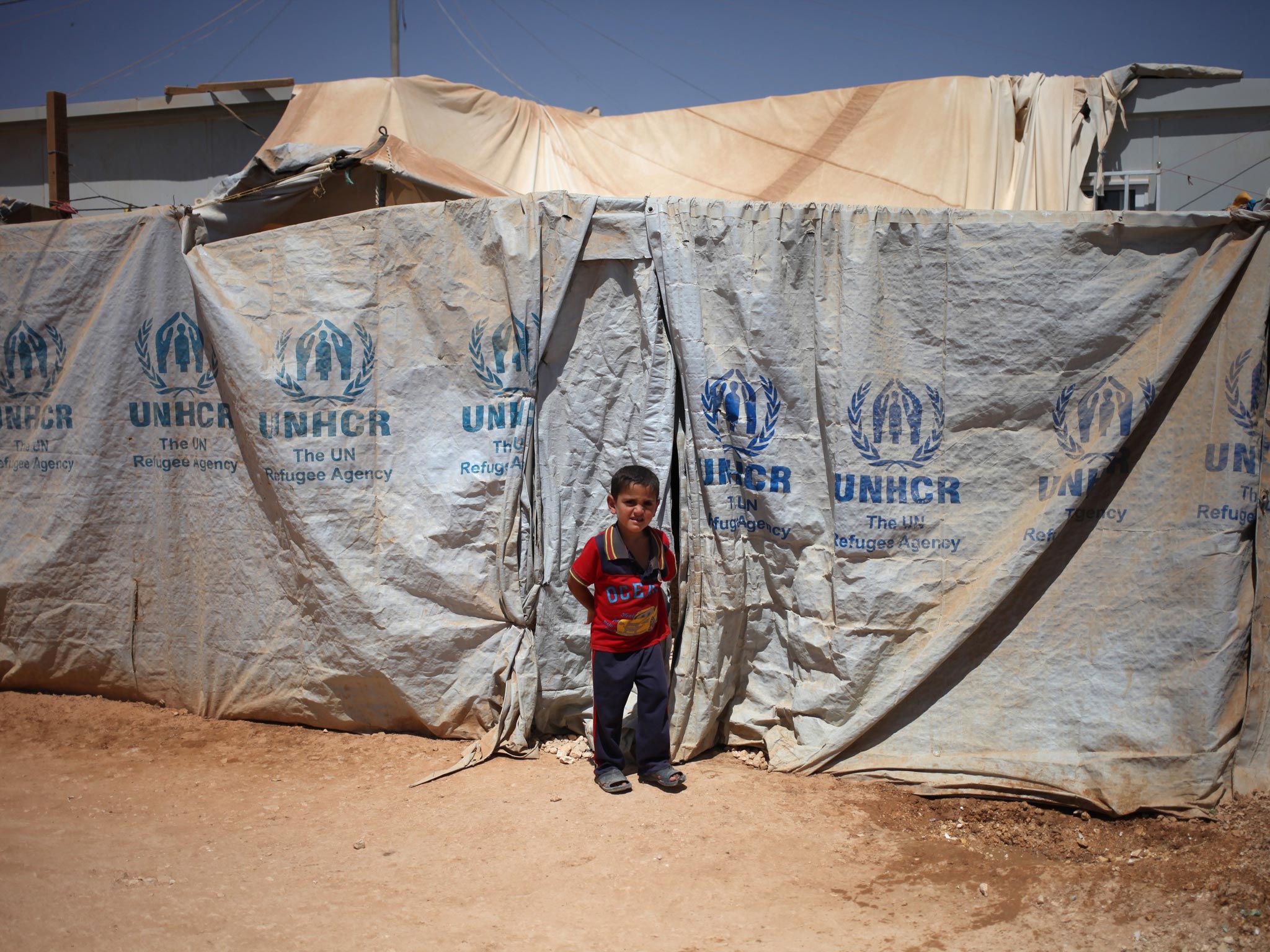Theresa May tells EU leaders to ‘crack down’ on illegal immigrants
The call comes as EU leaders back moves to accelerate the deportation of failed asylum-seekers

Your support helps us to tell the story
From reproductive rights to climate change to Big Tech, The Independent is on the ground when the story is developing. Whether it's investigating the financials of Elon Musk's pro-Trump PAC or producing our latest documentary, 'The A Word', which shines a light on the American women fighting for reproductive rights, we know how important it is to parse out the facts from the messaging.
At such a critical moment in US history, we need reporters on the ground. Your donation allows us to keep sending journalists to speak to both sides of the story.
The Independent is trusted by Americans across the entire political spectrum. And unlike many other quality news outlets, we choose not to lock Americans out of our reporting and analysis with paywalls. We believe quality journalism should be available to everyone, paid for by those who can afford it.
Your support makes all the difference.Theresa May has confronted Europe’s leaders with a demand to “crack down” on illegal immigration as they backed moves to accelerate the deportation of failed asylum-seekers.
Two days after her heavily criticised attack at the Tory conference on the scale of migration to Britain, the Home Secretary struck a similar hardline note in talks over the EU’s response to the arrival of huge numbers of refugees and migrants.
She also faced demands to reverse a “disgraceful” decision by the Government to withdraw two ships from the Mediterranean where they had been picking up refugees packed into tiny boats.
By contrast, Chancellor Angela Merkel delivered a spirited defence of Germany’s migration policy, insisting it was her “damned duty” to help refugees and spoke of her pride over the friendly welcome they had received.

EU interior ministers, meeting in Luxembourg, agreed to step up deportations to countries such as Eritrea which are considered safe for the return of refused asylum-seekers.
With fewer than 40 per cent actually leaving the EU, they also approved moves to detain people ahead of deportation who might abscond before expulsion. Arriving for the talks, Ms May said that instead of relocating migrants who land on Europe’s shores, governments should take more refugees directly from camps in places such as Turkey, Lebanon and Jordan.
“We need to ensure that we break the link between people making a dangerous journey to Europe and being able to stay in Europe,” she said.
Pointing to David Cameron’s Britain’s promise to accept 20,000 Syrians from refugee camps over the next five years, she said: “The UK has a good record in this area, but on returns we need to see Europe upping its game.”
Earlier, Ms Merkel confronted critics of policies that have allowed an estimated 300,000 migrants to enter Germany in the past month.
In a television interview, she said that as head of a Christian party she refused to take part in a “competition” to discover “those who are the most unfriendly to refugees, will stop them coming in”. She added: “We cannot close our borders, we have got a 3,000 kilometre-long frontier. We would have to build a fence. There is no such thing as a stop to the intake.”
Ms Merkel described the predominantly Syrian and Afghan migrants arriving in Germany as “people who are running for their lives.” She added: “I am proud we are giving a friendly welcome to refugees.”
The Chancellor’s remarks met with a deluge of approval online and even the normally critical Der Spiegel magazine’s online site described her televised response to the crisis as one of the “most honest” of her political career.
The EU’s interior ministers last night admitted they needed to do a better job of ensuring that only migrants who needed asylum would be guaranteed a new home in Europe. “Increased return rates should act as a deterrent to irregular migration,” they said in a joint statement.
They agreed to use aid budgets, trade deals and visa arrangement to achieve more “leverage” to encourage African and other poor states to accept the return of citizens refused entry to Europe. They will draw on legal clauses in the EU’s trade deals with African countries to insist that they take back their own nationals who have been assessed as economic migrants.
The ministers also discussed ideas to beef up the EU’s external borders, including the possibility of shared border management. These include setting up a new European coast guard or a rapid reaction team to intervene in emergency cases.
Meanwhile, two Royal Navy border force cutters, HMC Protector and HMC Seeker, which have rescued 1,651 migrants, have been ordered back to the UK.
Yvette Cooper, Chair of Labour’s Refugee Taskforce, said: “This is a disgraceful move by the Government. Each month over a hundred desperate people are drowning in the Mediterranean, thousands more are risking their lives in rickety boats. To turn our backs on those in peril on the sea is immoral. This is the greatest humanitarian crisis since the Second World War and we have a duty to help. David Cameron and Theresa May must not turn their backs and pretend this is not their problem.”
Join our commenting forum
Join thought-provoking conversations, follow other Independent readers and see their replies
Comments